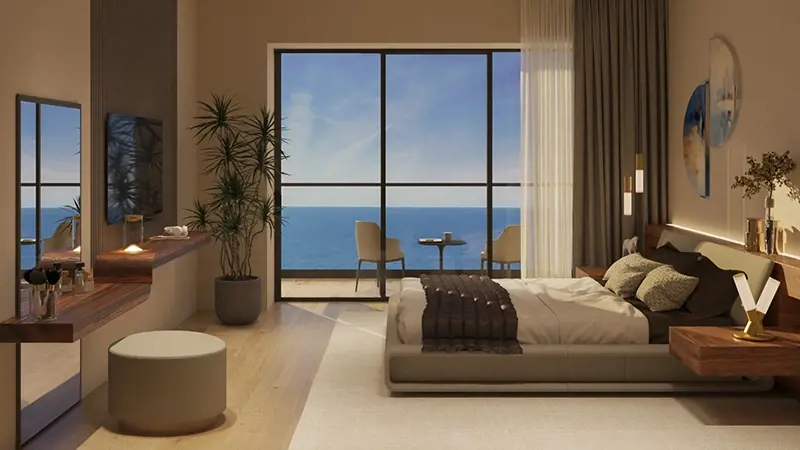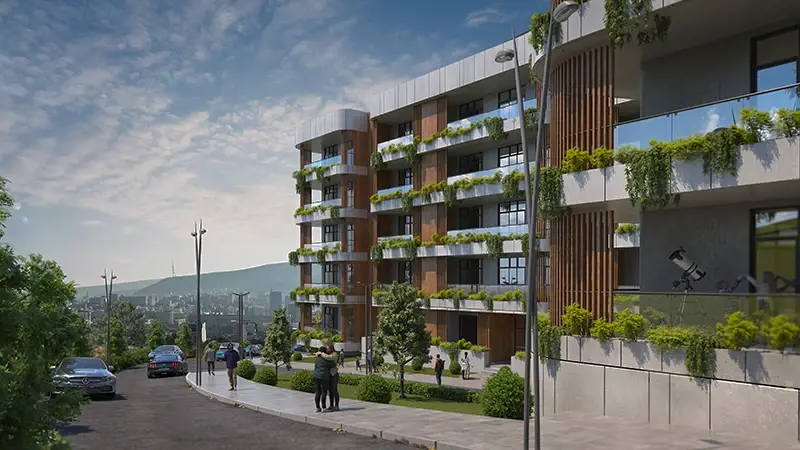Top 5 Trends Shaping the Market for Apartment Buildings in Georgia
#Other
Georgia's real estate market is on fire. Not that hard to see why, there was a pretty solid 9.4% GDP growth in 2024. And the real estate market was a substantial part of that growth: residential property prices jumped over 11% in the first quarter of 2025. A smart investor knows that the numbers aren’t always the whole story, but they are the introduction and the way they introduce Georgia is definitely positive.
What makes the investors who have been at it for a while successful is that they know what to look for beyond numbers: sure, the market looks hot now. But what makes an asset “future-proof”? Nobody has found long-term success just riding the current wave—the opposite, in fact. Success in real estate depends on securing a property that will grow in value for years to come—and that means anticipating how our lifestyles will change. The ROI of your apartment building investment will depend on how the property aligns with how we will live, work, and connect tomorrow.
Here are the five pivotal trends that seem to be defining the future of apartment buildings in Georgia, and should help you recognize the real, long-term value hidden in plain sight.

Trend 1: The Ever-Rising Demand for "Live-Work-Play" and Integrated Communities
The standard for desirable living has changed. Instead of the usual residential towers, today's home buyers and renters are looking for properties that are communities by themselves. They want to be able to live, work, shop, and have fun all in one place. This is what defines a premium property these days. In a highly dense city like Tbilisi, where traffic is on the rise, NOT having to waste time commuting is one of the ultimate marks of luxury.
You can already see this shift happening across Georgia. The explosion of co-working spaces, for example, is a clear signal that the market is primed and ready for this integrated way of living. When exploring real estate in Georgia, try to at least check out properties that promise integrated community amenities. They tend to attract a high-earning, long-term tenant base, thus showing greater resilience during times of market fluctuations.
Archi Universe on Tbilisi's bustling University Street is a good example of such community-focused development. The project’s two residential blocks are connected by a massive commercial area. Residents can enjoy a European-standard fitness hall, an outdoor pool, cafes, a supermarket, and a pharmacy, without ever leaving the complex. It's a prime case of a developer understanding that the "community" itself is the most valuable asset.
Trend 2: The Green Imperative, Sustainability and Energy Efficiency for apartments buildings in Georgia
In today's market, “sustainability” rhymes with financial intelligence. As energy costs continue to climb, the main focus has shifted from eco-friendliness to the more practical side: the long-term value of energy-efficient construction. Living in green apartment buildings means owners save every single month on their utility bills. But let’s not knock down eco-friendliness either; it’s still a factor. While the savings are a current, tangible benefit, the overall healthier living spaces in these constructions are also a selling point. If you check how much an apartment is in Georgia, you’ll see that green buildings consistently command higher resale prices.
That’s how you check if the asset is “future-proof”: consider the total cost of ownership for years to come. High-quality tenants have been increasingly voting in favor of sustainability initiatives with their wallets, actively seeking out properties that promise a healthier environment and lower utility bills. If you want to invest in apartment buildings, ignoring modern energy standards is a surefire way to face a "brown discount" on the resale market in the future.
Some developers make it simple for buyers by building their entire brand on a verifiable promise of quality. Real Estate Development Company Archi, for example, has made the use of German YTONG energy-efficient building blocks a core feature across the entire portfolio. A promise of a 40% reduction in energy consumption for heating or cooling sounds like a more tangible benefit to homeowners than the abstract idea of “sustainability.”

Trend 3: The Suburban Expansion and the Quest for Green Space
When learning about real estate investing in Tbilisi, start with the basics—look at where people are choosing to live. There’s a solid rise in migration from rural areas to the suburbs of major cities. The people are increasingly looking for a balance these days: they want career opportunities in the city but without sacrificing the benefits of the green spaces and a healthier lifestyle. The market data tells the same story. According to Colliers Georgia, newly-built apartments in Tbilisi's suburbs saw prices jump 10.5% in early 2025, while in 2024, market reports saw some suburban districts increase between 13% and 16%.
The problem? Much of this growth has been chaotic. Some locations have nothing but apartment buildings, not even basic infrastructure like schools, parks, and organized transport. Not that attractive when looking for an apartment in Tbilisi for a growing family. But it creates a golden opportunity for developers willing to provide a solution: combine the peace and space of the suburbs with the amenities and infrastructure of the city, and the new buyers will flock to you instead of the competitor, even if they have to pay more.
Archi Lisi Sunrise is exactly what happens when a developer listens to market demands. The project combines residential buildings with extensive leisure facilities—including a cinema, swimming pool, and gym. And at the center of it all is a massive 15,000 sq m. green yard. It’s the textbook optimal compromise this new buyer is ready to give up the city center for: green spaces, community living, and yet, without giving up the infrastructure benefits of the city itself, including a comfortable commute.

Trend 4: The Rising Global Demand in Georgia Apartment Buildings: Serving Digital Nomads, Expats, and International Investors
Thanks to game-changing policies like the "Remotely from Georgia" digital nomad visa and remarkably beneficial taxes on buying property in Georgia for foreigners, the country has enjoyed a great influx of global citizens buying and renting here over the last few years. And the wave doesn’t seem to be stopping anytime soon. This has created a demand for a new class of real estate: sophisticated, turn-key properties that offer a seamless investment and lifestyle experience.
The expats provide a strong, stable floor for the rental market, especially for modern, professionally managed properties. For overseas investors looking at apartment buildings for sale, "turn-key" solutions that promise passive income and easy ownership are the holy grail. The market is maturing to meet this demand with the rise of branded residences, which remove the guesswork and guarantee a global standard of quality.
Archi, of course, couldn’t pass up on capitalizing on this trend. Archi Ramada Batumi is a multi-functional aparthotel developed in partnership with the globally-renowned Ramada Encore by Wyndham. The model is brilliant: Archi delivers the high-quality construction, while Wyndham provides global marketing reach and professional hotel management. Crucially, the "hotel pool" financial structure de-risks the investment entirely. All revenues are pooled and distributed among the owners, meaning you don't have to worry about your specific unit sitting vacant. It’s an institutional-grade investment product that is incredibly appealing to a global audience. The model worked so well, in fact, that the company invested in a second partnership with a global brand. The more luxurious Archi Sioni Lake Resort & Spa, developed with the Le Meridien brand, caters to the high-end tourism and second-home market for a discerning international clientele.
Trend 5: The Infrastructure as a Deciding Factor in Real Estate Appreciation
Sure, there’s no such thing as a 100% foolproof real estate boom predictor. But if you want to know where people are most likely to go, follow the government's infrastructure spending. To put it simply: people like being comfy. Public projects—well-maintained roads, parks, schools, etc—make people comfy. But not only that, they create new jobs. A place attracts people—people need something—someone has to provide that something, and often filling the role means attracting more people.
Large-scale public projects, like new highways and railways, are often such powerful economic catalysts that they transform entire regions. In Georgia, the massive East-West Highway—the "project of the century"—is set to dramatically improve connectivity between Tbilisi and the vital economic hubs on the Black Sea coast.
This national strategy strengthens the investment case for projects like Archi Ramada Batumi. The completed highway will slash travel times, leading to a surge in tourists and dramatically increasing the demand for quality accommodation like the aparthotel. This principle also works on a local level. The construction of a new bridge in front of Archi Universe in Tbilisi directly connects the area to Bagebi, improves cross-district connectivity, eases commutes, and adds tangible value to the property. Connectivity, at any scale, is a direct driver of real estate value.
An investor looking at apartments for sale in Georgia should always seriously consider buying property in cities and regions that sit along the new and prospective transport corridors as a strategy for growth potential that is virtually underwritten by the state.







